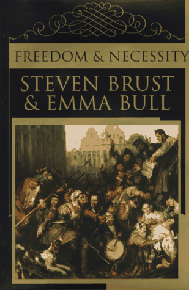

FREEDOM AND NECESSITYby Steven Brust & Emma BullTor0-312-85716-0383pp/$23.95/April 1997 |
 |
Reviewed by Steven H Silver
There are some books which, no matter how much you want to enjoy them, you just don't enjoy. Steven Brust and Emma Bull's recent collaboration, Freedom and Necessity is one of those novels. Although it has received praise in several quarters, and although it is certainly a more literary novel than many published by speculative fiction authors, Freedom and Necessity comes across as pretentious.
The authors are striving to recapture the feel of language as used in the mid-nineteenth century. In this, they are extremely successful. This novel could have easily been written by one of the Bronte sisters. Brust has attempted, and achieved this type of mimicry before in the "Khaavren romances" modeled on Alexandre Dumas's "D'Artagnan romances." In both cases, I would find myself recommending the originals long before I would recommend reading Brust's attempt to recreate them. In style, he has them down nearly perfectly, but Dumas or the Brontes write Dumas and Bronte novels much better than Brust or Bull.
Brust and Bull's epistolary novel is set in England, 1849. It opens with the discovery that James Cobham, seen drowned a couple of months earlier by his entire family, is still alive. Acting on the advice of his cousin Richard, James continues to hide from all who know him until they he and Richard have managed to discover who was behind James's mysterious disappearance. This separation of a wealthy Englishman from his source of income and status works much better than the situation set up in Nicola Griffith's novel, Slow River. Eventually, the secret is discovered by other members of the extended Cobham clan and they begin to delve into James's past, to discover much about their cousin/brother they never knew.
I've written of several places this novel succeeds, and it does on many levels. My problem with the novel, however, is the pace, compared to which a snail is a speeding locomotive. Because the authors have elected to write in the form of letters and diaries, nothing actually occurs on stage. Everything is related after the fact, thereby alleviating any sense of suspence. When Richard is describing being attacked, we know he survives simply because if he hadn't, there would be no letters or journal entries describing the event.
On the other hand, much of the nineteenth-century flavor of the novel comes from the fact that it is composed as first hand accounts of the events surrounding the Cobham family. There can be no denying that stylistically Freedom and Necessity is a fantastic success. Unfortunately, it does not work as well as a piece of fiction. Eventually, I became interested in the events surrounding James Cobham's death and resurrection, but I found it difficult to force my way through the prose to discover what those events were.
